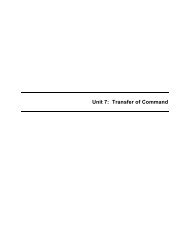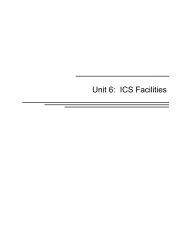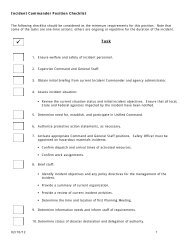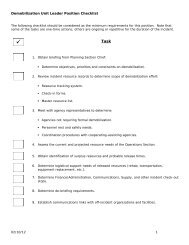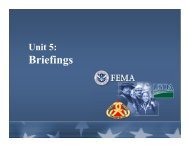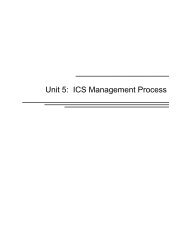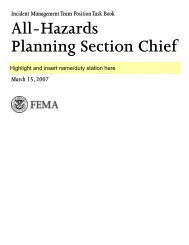EMI Course Catalog - Emergency Management Institute - Federal ...
EMI Course Catalog - Emergency Management Institute - Federal ...
EMI Course Catalog - Emergency Management Institute - Federal ...
You also want an ePaper? Increase the reach of your titles
YUMPU automatically turns print PDFs into web optimized ePapers that Google loves.
INDEPENDENT STUDY<br />
COURSES<br />
EmErgEncy managEmEnt InstItutE • 2011-2012 • catalog of coursEs<br />
basic introduction to NIMS; it is not designed to<br />
replace Incident Command System or positionspecific<br />
training.<br />
CEUs: .3<br />
Study Hours: 3<br />
Multi-Agency Coordination System (MACS)<br />
<strong>Course</strong> (IS-701 .a)<br />
This interactive computer-based NIMS course<br />
prepares participants to use the components of a<br />
Multi-Agency Coordination System and establish<br />
relationships between all elements of the system.<br />
After taking the course, participants should be able<br />
to:<br />
• Define multi-agency coordination at the local,<br />
State, and <strong>Federal</strong> levels of government.<br />
• Identify each agency involved in incident<br />
management activities to ensure appropriate<br />
situational awareness and resources status<br />
information is shared through multi-agency<br />
coordination.<br />
• Identify typical priorities established between<br />
elements of the Multi-Agency Coordination<br />
System.<br />
• Define key terms related to the Multi-Agency<br />
Coordination System.<br />
• Describe the process of acquiring and allocating<br />
resources required by incident management<br />
personnel in relationship to the entire Multi-<br />
Agency Coordination System.<br />
• Identify typical future resource requirements for<br />
the entire Multi-Agency Coordination System.<br />
• Identify potential coordination and policy issues<br />
arising from an incident relative to the entire<br />
Multi-Agency Coordination System.<br />
The primary functions of Multi-Agency Coordination<br />
Systems addressed in the course are: to support<br />
incident management policies and priorities; facilitate<br />
logistics support and resource tracking; make<br />
informed resource allocation decisions using incident<br />
management priorities; coordinate incident<br />
management-related information; and coordinate<br />
FEdErAL EmErgENCy mANAgEmENT AgENCy 170<br />
interagency and intergovernmental issues regarding<br />
incident management policies, priorities, and<br />
strategies.<br />
There also is a group study version of this course by<br />
which it may be delivered in the classroom.<br />
CEUs: .5<br />
Study Hours: 5<br />
National Incident <strong>Management</strong> System<br />
(NIMS) Public Information Systems<br />
(IS-702 .a)<br />
The public information systems described in NIMS<br />
are designed to effectively manage public information<br />
at an incident, regardless of the size and<br />
complexity of the situation or the number of entities<br />
involved in the response. The goal of this course is to<br />
facilitate NIMS compliance by providing participants<br />
with the basic information and tools that they need<br />
to apply the NIMS public information systems and<br />
protocols during incident management. This course<br />
is designed for local and State Public Information<br />
Officers.<br />
CEUs: .3<br />
Study Hours: 3<br />
National Incident <strong>Management</strong> System<br />
(NIMS) Resource <strong>Management</strong> (IS-703 .a)<br />
This interactive computer-based course provides<br />
the principles, tools, processes, and systems used in<br />
NIMS that incident managers need for timely and<br />
effective resource management during an incident.<br />
Primary tasks addressed in this course are:<br />
• Establishing systems for describing, inventorying,<br />
requesting, and tracking resources;<br />
• Activating these systems prior to and during an<br />
incident;<br />
• Dispatching resources prior to and during an<br />
incident; and<br />
• Deactivating or recalling resources during or<br />
after incidents.




